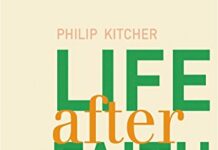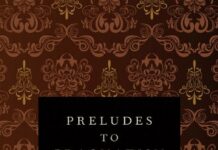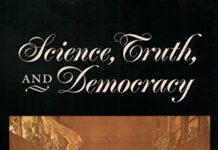
Ebook Info
- Published: 1985
- Number of pages: 300 pages
- Format: PDF
- File Size: 15.00 MB
- Authors: Philip Kitcher
Description
This book argues against the view that mathematical knowledge is a priori, contending that mathematics is an empirical science and develops historically, just as natural sciences do. Kitcher presents a complete, systematic, and richly detailed account of the nature of mathematical knowledge and its historical development, focusing on such neglected issues as how and why mathematical language changes, why certain questions assume overriding importance, and how standards of proof are modified.
User’s Reviews
Editorial Reviews: Review “Outstanding–clear, readable, and convincing.”–Patricia Churchland, University of California, San Diego”Does an excellent job of tracing the evolution of mathematical rigor. It is a must for the entire academic community.”–R.L. Pour, Emory and Henry College”A valuable and important book…It is a pleasure to see Philip Kitcher making such an original contribution to the philosophy of mathematics, and to general philosophy also. All told, it marks him as having one of the freshest minds at work in Anglo-American philosophy today.”–Nature”A truly fascinating account.”–Library Journal”An impressive display of erudition and philosophical acuity….Should play a significant role in both the philosophy and historiography of mathematics.”–British Journal for the Philosophy of Science From the Back Cover In this book Philip Kitcher argues against this ‘mathematical apriorism.’ He offers a fresh, alternative approach that links mathematics to natural science and portrays mathematics as a body of knowledge that evolves through its history. About the Author Philip Kitcher is at University of California, San Diego. Read more
Reviews from Amazon users which were colected at the time this book was published on the website:
⭐This book presents a theory of mathematics that argues our abilities in math come from perception leading to elementary mathematical knowledge on which is built the edifice of further theory. At the moment I am reading two other books that reminded me of this argument. One is Retrieving Realism by Charles Taylor and Hubert Dreyfus and the other is Seeing Things as They Are by John Searle (which I have just barely begun) that both strike me as trying to do something similar. That is they are trying to do an end run around what Taylor refers to as the mediational theory that basically cuts knowledge off from reality – or rather, from the possibility that we could have certainty regarding the world apart from our perceptions. Of course, even that summary is mistaken since the issue is more complex than that. Or what might be called disjunctivism (but which he calls Conceptual Dualism) as I understand it in Searle’s argument and Searle says “Austin refuted the argument from illusion.” – which argument is a major step here. But regarding Philip Kitcher’s attempt in the Nature of Mathematical Knowledge we have what may be the most certain type of knowledge being puzzled out regarding the source of that sense of certainty. Recalling Wittgenstein’s statement that the type of certainty one has is a result of the type of language game one is using – we can think of mathematics as the most rigorous language game and so our sense of certainty (a different category than knowledge granted) is greatest in mathematics. But how do we get it? Do we perceive numbers? But this whole project strikes me as suspicious. Haven’t we been convinced that Western Philosophy has been a history of progress? The progress was partially because of the correct step that we are now contemplating reversing in order to retrieve realism? But here we can see the effort by Kitcher who deals adequately I think with the puzzles even if the results are not conclusive.
⭐Most of what Kitcher has to say is commonsensical, often to the point of triviality. When he ventures beyond the trivial he betrays a crippling narrow-mindedness. I shall discuss one example of this: Kitcher’s dismissal of the role of aesthetics.Kitcher characterises the growth of mathematical knowledge as a self-perpetuating process in which the research agenda is suggested and determined by recent advances (ch. 9, esp. §III). Kitcher thinks he can explain why this process is “rational” so he gets annoyed when mathematicians speak as if they did not adhere to it. Instead, they “describe themselves as pursuing some inquiries because they are ‘interesting’ or ‘beautiful.'” Kitcher proposes a false consciousness theory to explain away this fact: “We may view the mathematicians as responding to the fact that some questions are rationally generated, in the ways I have identified above, and characterizing their responses in terms of interest or beauty. To simplify, what makes a question interesting or gives it aesthetic appeal is its focussing of the project of advancing mathematical understanding, in light of the concepts and system of beliefs already achieved.” (p. 206).To support his false consciousness theory Kitcher attacks what he takes to be the strongest case for an aesthetics-based model: “If any case would support that hypothesis, it would seem to be that of the development of transfinite set theory.” “I reply that the considerations I have adduced above show why Cantor’s generalization of mathematics was rational. That generalization advanced our understanding in a number of ways, acquainting us with the distinction between ordinality and cardinality, isolating one-to-one correspondence as fundamental to cardinality, displaying analogs of finite arithmetical operations, improving our grasp on the structure of the real numbers. So we can account for Cantor’s extension without simply describing it as ‘beautiful’ or ‘interesting’. By recognizing the explanatory dividends, we expose what the aesthetic appeal and interest of transfinite set theory consist in: the theory is beautiful because of its forging of previously unsuspected connections among previously recognized entities and properties.” (pp. 211-212)This last reduction makes no sense at all. Consider first the claim that beauty consists in “forging previously unsuspected connections.” We all know that a new proof of an old theorem can be beautiful. Therefore the term “unsuspected connections” must be understood to include not just theorems but any novel ideas or methods whatever. But how could there ever be any new mathematics which does not satisfy this criterion? Nor do I think that the restriction to “previously recognized entities and properties” has any teeth. Discoveries regarding uncountable sets apparently fall into this class by virtue of some vague affinity with real numbers and finite sets. If this suffices for recognition then what could possibly count as an unrecognised entity? I conclude that Kitcher’s reductionist theory of beauty carries no counterfactual force: it is as meaningless as saying that a painting is beautiful because it is two-dimensional.Even worse, Kitcher goes on to put his own views in the mouth of Cantor. “In a famous passage, Cantor defends his transfinite set theory against those who would restrict mathematical discourse to what can be translated into the language of the arithmetic of natural numbers. He argues initially that mathematicians are free to fashion new concepts so long as they do not involve themselves in contradictions. But a second theme soon emerges. Unfruitful or pointless concepts will quickly disappear from mathematics. Cantor’s celebrated concluding line, the assertion that the essence of mathematics lies in its freedom, should be understood in light of the two constraints he has imposed on that freedom. Mathematical stipulation is legitimate only if it is reasonable to think that the usage introduced is consistent and that it will prove fruitful. Cantor does not suggest that mathematicians should follow wherever whimsy leads them. Instead, he emphasizes the fact that mathematical concept formation has a built in corrective. If a new approach yields no new understanding of prior mathematics (or gives no new explanatory tools to the scientist), Cantor does not claim that appeals to ‘beauty’ or ‘interest’ can save it. Thus I regard his own defense of set theory as supporting my thesis.” (p. 212)Cantor does not deserve to be associated with such fascist views, for what he actually said in the passage referred to by Kitcher is that mathematics should be developed “in complete freedom and without transient goals.” This crystal clear point can be misread only by someone with severe ideological cataract. Cantor’s point about fruitless theories is that they “will be abandoned for lack of success”; that is, post factum, rather than, as Kitcher would have it, being condemned in advance by someone who professes to be “reasonable.”Read Cantor’s own account of his motivation for set theory and ask yourself if it fits Kitcher’s model: “I am also working on the application of set theory to the natural theory of organisms, where we cannot apply traditional mechanical principles. … For that purpose it was necessary to create completely new mathematical tools, which in essence can be found in those parts of set theory that I have developed. I have been working on this project of a precise deepening into the essence of everything organic for 14 years already. It constitutes the real motivation why I have confronted … the fatiguing enterprise of investigating point-sets, which promises little recognition.” (Letter to Mittag-Leffler, 22 Sep. 1884)
⭐
Keywords
Free Download The Nature of Mathematical Knowledge 1st Edition in PDF format
The Nature of Mathematical Knowledge 1st Edition PDF Free Download
Download The Nature of Mathematical Knowledge 1st Edition 1985 PDF Free
The Nature of Mathematical Knowledge 1st Edition 1985 PDF Free Download
Download The Nature of Mathematical Knowledge 1st Edition PDF
Free Download Ebook The Nature of Mathematical Knowledge 1st Edition





